Voices from the new Synod
2015. március 13., péntekAll of the four church districts represent themselves in the Presidium of the Synod of the Reformed Church in Hungary, which elected its leadership at its constituting meeting on 25th February 2015. The new office holders shared their thoughts and plans for their work in the upcoming 6 years term. At its next session, the Synod will elect the new General Secretary of RCH and decide on the priorities of its work.
Election results
Dr. István Szabó Bogárdi, Bishop of the Danubian Reformed Chruch Disctrict (Budapest) was elected Ministerial President of the Synod. His deputy became Dr. Károly Fekete, who started his first term in office as Bishop of the Transtibiscan Reformed Church District (Debrecen) this year. Dr. Pál Huszár, Chief Elder of the Transdanubian Church District (Pápa) was re-elected as Lay President, the Vice Lay President, Tibor Ábrám, comes from the Cistibiscan Reformed Church District (Miskolc). Zsuzsa Fekete, from Parokia Portál asked the members of the presidium for a first evaluation after their election.
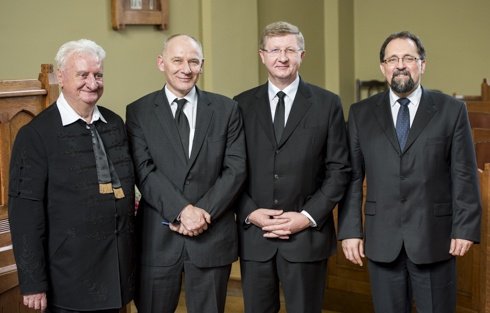
Up-to-date, efficient and dynamic Church
István Szabó emphasized that the task of the Presiding Bishop was, and will always be to guide the governing body of hundred members with all his might thus, that correct legislation, and, if necessary, reformulation of some of the teachings of the Church, and the reassessment of the reformed identity is provided. These are namely the main duties of the Synod. “The Church has to be represented in the public life, in society, and in inter-church relations. In the future, our teaching has to be formulated so that it is up-to-date, more efficient and dynamic. I would like to convince the Church members to start reading reformed theology, as this would be the basis for discussions about how eternal truths can be communicated the 21 century with relevance”- expressed the newly elected Presiding Bishop of the Synod of the RCH.
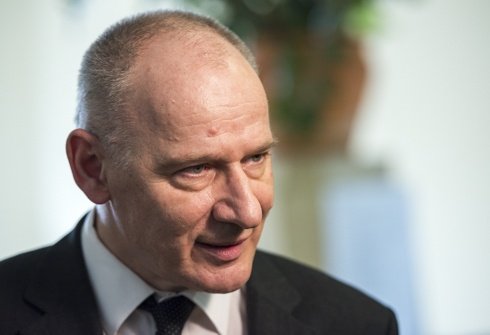
“I will not reveal a secret, if I share that we have recently committed ourselves to serve together in dialogue and cooperation. If we cannot make this happen, how could we expect it from our church bodies and our members?”
Szabó reminded that Church and the State have been separated since the end of 19. Century even if many do not want to realize it, or act as if it were not so. “The Church and the State are functioning separately. We have to practice the old principle of a free Church in a free State. The Reformed Church is free as long as the State is free, and vice versa. The relation with politics is more complicated because in the current Hungarian state-system the representatives of the political parties are sitting in the parliament, and they determine the legislation. A partnership is needed: we must appreciate that those who are in the parliament are trying to regulate the life of the country. At the same time, it is important for the politicians to realize that they are in the same boat with the engineers, doctors, social organizations, priests and Churches” – he added. The Bishop also spoke of the necessity of a total financial independency of the Church. “In the Danubian Reformed Church District we have already initiated processes so that we become financially self-supporting. Concerning the Reformed Church in Hungary, we can start this process, if my fellow bishops and the Synod members give their support. The process however could be much longer than six years.”
A well-ordered, but relevant Church
Károly Fekete, Bishop in Debrecen and Vice-Ministerial President of the Synod, first reacted to the result of the elections: “I came with open heart together with the delegates of the Transtibiscan Church District. Those who had decided on the officers of the Synod already knew us personally. They knew that we have always been working for the Church.” – said Fekete.
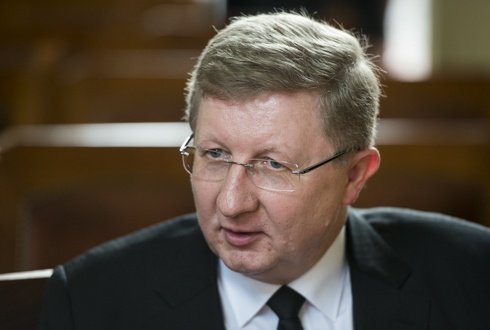
As for the future, he stressed the importance of the spirit of cooperation and the good order in church life. “The bishops of the four church districts must reach a consensus in all circumstances. It is not our offices and positions which determine the way of our cooperation, but the huge challenges ahead of us. We would like to close processes started in the previous six years period and give orientation to the pastors concerning occasional services, after all baptism and confirmation. We are characterized by too many different practices. It is necessary to create some order in this so that church members know what they can expect from us and what they are entitled for. They have to be aware of the significance of the sacraments and their commitment as church members. It is not about building barriers but to define the threshold which protects the unity of our Church, insure the purity of its teaching and in the same time takes into consideration that it is the merciful God who sends us into mission. The openness as an approach or attitude is necessary, but it shouldn’t lad to give up our principles in life and teaching. We shall find a narrative to the teaching and ideas of the Reformation, which makes them relevant for today. Otherwise, we will be looked at as an isolated community, an enclave.”
Working together in full consent
“I’m endlessly grateful to God for the possibility of serving another six years as Lay president” – expressed Dr. Pál Huszár who was re-elected with overwhelming majority.
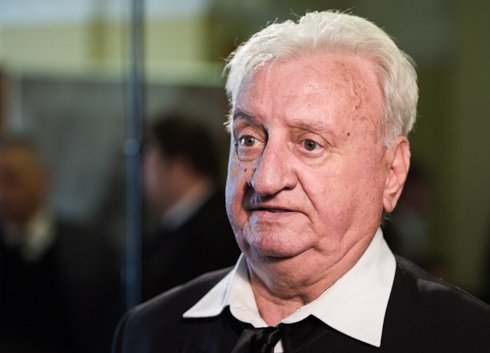
“God gave me such spiritual gifts and joy in the past six years that I’m glad to accept the mandate for another term. I am 74 years old now, but I receive this decision as a sign of trust from the members of the Synod and accept it with great enthusiasm, hope, humbleness and gratitude. Before the elections it was no secret that I would gladly continue this service and if I could do my work a little bit better it would be a great pleasure to me. I would like to support and strengthen the service of other lay members too, and it would be great to work together for the future of the Church in full consent. The Reformed Church is shrinking; the congregations are decreasing. This tendency should be stopped. We have means for this: mission projects started in cities and in diaspora situations, university chaplaincies and schools. Just to give an example: in schools we have events which attract also non-believers. Anyway, it is a great challenge for the pastors to reach out ofr those who had not been member of the congregation.”
Faithfull, confessional and credible
Tibor Ábrám has been elected as officer of the Synod for the third time. In the next six years he will fill the mandate of the Vice Lay President of the Synod. For him, this is not merely about work, but a ministry which is oriented by mission.
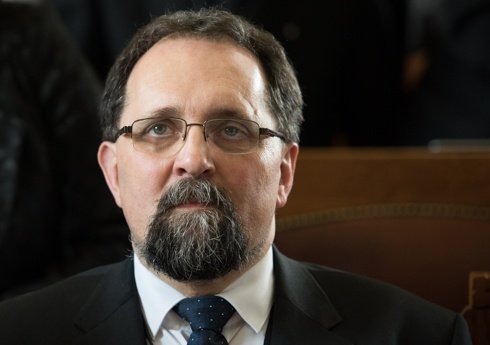
“The newly elected Synod has to focus on three principles. The service and the work which we are doing in the congregations or as a Church leaders requires faith. We also have to be “confessional”. It is not by chance that in these years confessions have been part of our Agenda, just think of the new translation of the Heidelberg Catechism. The Reformed Church has to live out the communion with God not only within the community of faith, but also in public witness. Credibility as a third principle reminds us that our faith has only a value if it impacts and shapes our everyday life. I consider it a great achievement that the previous Synod discussed in depth about the future of our Church. I see many progressive signs, which can guide us, by God’s grace, towards renewal.”
Original version: Zsuzsa Fekete
Photo: Tamás Füle
Source: Parókia Portál
English version: János Neuberger
Edited by the Ecumenical Office
Contact us
Click here if you are interested in twinning.
Reformed Church in Hungary
Address: H-1146 Budapest, Abonyi utca 21.
PO Box: 1140 Budapest 70, Pf. 5
Email: oikumene@reformatus.hu
English, German and Korean language services in Budapest
Links
Recommended articles
-
Pastoral Letter in the Light of the Pandemic
Bishop Dr. István Szabó sent a pastoral letter of encouragement to the ministers serving in RCH’s congregations, expressing his gratitude for the persistence and creativity of the pastors.
-
RCH Joins in Pope's Call for Prayer
RCH published the call on congregations to join the initiative of Pope Francis, supported by ecumenical organisations, to unite in praying the Lord’s Prayer on Wednesday, 25 March, at noon.
-
English Speaking Worship Services Online
Each Sunday at 11 AM (CET) the St. Columba's Church of Scotland in Budapest, the international community of RCH invites you to join the worpship service on its facebook page.
-
Test of Humanity and Companionship
Reformatus.hu asked Dr. György Velkey, Director General of the Bethesda Children’s Hospital of RCH about the challenges of health care workers and ways of prevention against the pandemic.
-
All Church Events Suspended
In light of the coronavirus the Presidium of RCH requested congregations to suspend all church events with immediate effect. Beside restrictions, it calls for prayer, sobriety and responsibility.











